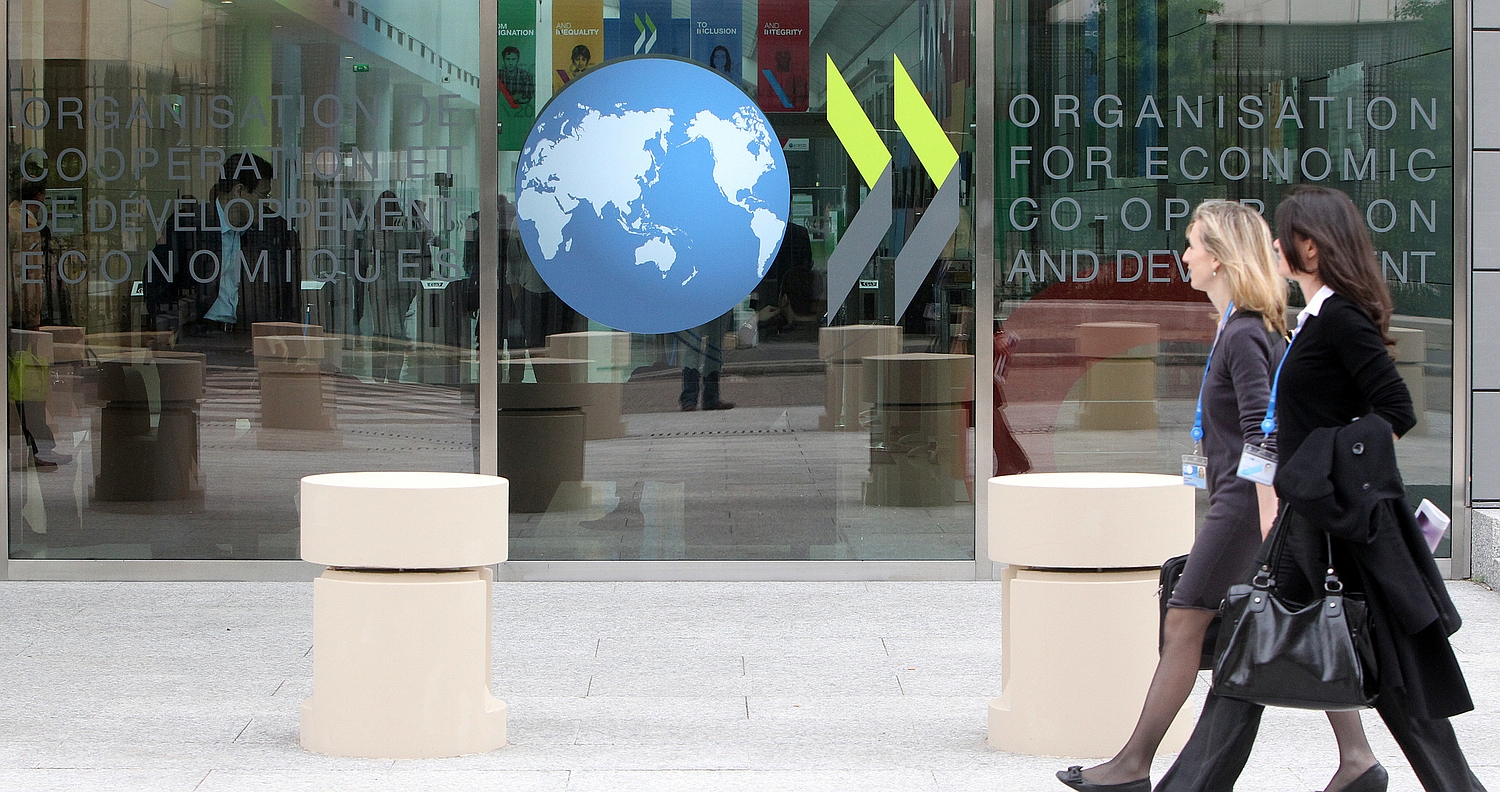The OECD's main objective is to improve the lives of humans worldwide both economically and socially ('build better policies for better lives'). It offers governments a forum to exchange information and find joint solutions for the global challenges. The International Bureau (IB) supports the Federal Ministry of Education and Research (BMBF) in its work in the OECD committees and working groups on education, science and technology.

© Victor Tonelli / OECD
Content
Current developments
The current central educational topics are presented each year in the OECD flagship publication 'Education at a Glance'; Germany has been actively involved in its preparation. This publication provides an overview of the education systems of the 38 OECD countries and the eight partner countries. Similar to past issues, the education policy goals of the United Nations Agenda 2030 formed the grid for the analyses in the 2023 issue.
The OECD flagship publication on science, technology and innovation (STI) topics 'Science, Technology and Innovation Outlook 2023' (STI Outlook 2023) was launched in March 2023. This issue focuses on strategic aspects of science, technology and innovation (STI) policies and on the role of STI policy as enabler of sustainability transitions in times of disruption. A meeting of OECD science and research ministers takes place in Paris on 23-24 April 2024.
The Science, Technology and Innovation Policy Compass (STIP Compass) is a joint initiative of the European Commission and the OECD that aims to collect together in one place qualitative and quantitative data on national trends in Science, Technology and Innovation. The latest dataset of the STIP Compass 2023 contains close to 8,000 active policy initiatives and more than 10,000 policy instruments from 57 countries and the EU, all of which is publicly available to support policy analysis and advice.
Structure
The OECD was founded in 1961 by a total of 20 countries. Today it has 38 member states.
OECD Members | Year of Accession © DLR
22 of the current 27 EU member states belong to the OECD. These also include founding member Germany. The European Commission participates in the work of the OECD as well. In 2022, the OECD opened accession discussions with five candidate countries: Brazil, Bulgaria, Croatia, Peru and Romania. In July 2022, the Ukraine sent the OECD a request for membership as well. The OECD also works with key partners like China, India, Indonesia and South Africa. In some cases, these countries already participate in the meetings of the education and researchbodies. In response to Russia’s large-scale aggression against Ukraine, the OECD Council decided in March 2022 to formally terminate the accession process with Russia and immediately suspend the participation of Russia and Belarus in OECD bodies. Until then, they were able to participate as observants in the OECD meetings and some projects.
The OECD is becoming increasingly globally oriented through dialogue intensification and cooperation with non-member countries throughout the world.
Goals and Activities
Through its analyses and studies, the OECD contributes to tackling global challenges. The OECD provides a framework for governments to share policy experiences, jointly seek solutions to common problems, identify best practices examples and work towards co-ordination of national and international policies.
The German Federal Ministry of Education and Research (BMBF) participates in the OECD committees, which are responsible for education and STI policy. In these committees, decisions are made on the implementation of projects and studies as well as on the development of indicators and the introduction of global standards. The results of the projects are discussed and finally released for publication. The International Bureau supports the BMBF in its work in OECD committees and working groups on education, science and technology by providing technical expertise.
Cooperation
The increasing importance of education policy issues at the OECD was proven by the the establishment of the Directorate for Education and Skills (EDU) in 2002. The work programme on education policy-oriented projects is coordinated by the Education Policy Committee (EDPC), in which the Federal Government is represented by the BMBF and the Länder by the Standing Conference of the Ministers of Education and Cultural Affairs. The Centre for Educational Research and Innovation (CERI) works on its own work programme with educational research projects that include social and economic aspects. It is steered by the CERI Governing Board.
Germany participates in the design and further development of the Education Directorate's flagship publication, Education at a Glance.
Germany also participates in PISA (Programme for International Student Assessment), the world-renowned international school performance study that measures the competences of 15-year-olds in the core subjects of mathematics, reading comprehension and natural sciences. Germany participates in the OECD project which determines the competencies of the adult population (PIAAC) as well.
Germany has been continuously involved in the OECD projects on vocational education and training, most recently through engaging in the feasibility study for a PISA for vocational training (PISA VET).
The OECD has had a directorate on STI policy since 1961 (then: Directorate for Scientific Affairs – DSA; today: Directorate for Science, Technology and Innovation - STI). The BMBF represents Germany on STI policy issues in the OECD Committee for Scientific and Technological Policy (CSTP), the Global Science Forum (GSF), the Working Party on Technology and Innovation Policy (TIP), the Working Party on Biotechnology, Nanotechnology and Converging Technologies (BNCT) and the Working Party of National Experts on Science and Technology Indicators (NESTI). Moreover, the BMBF participates in the development of the flagship publication 'Science, Technology and Innovation Outlook' (STI Outlook), which is published every two years.
The OECD has developed a digital database together with the European Commission. The Science, Technology and Innovation Policy Compass (EC-OECD STIP Compass) holds information on STI policy initiatives from currently 57 countries and the EU in a comparable form.








